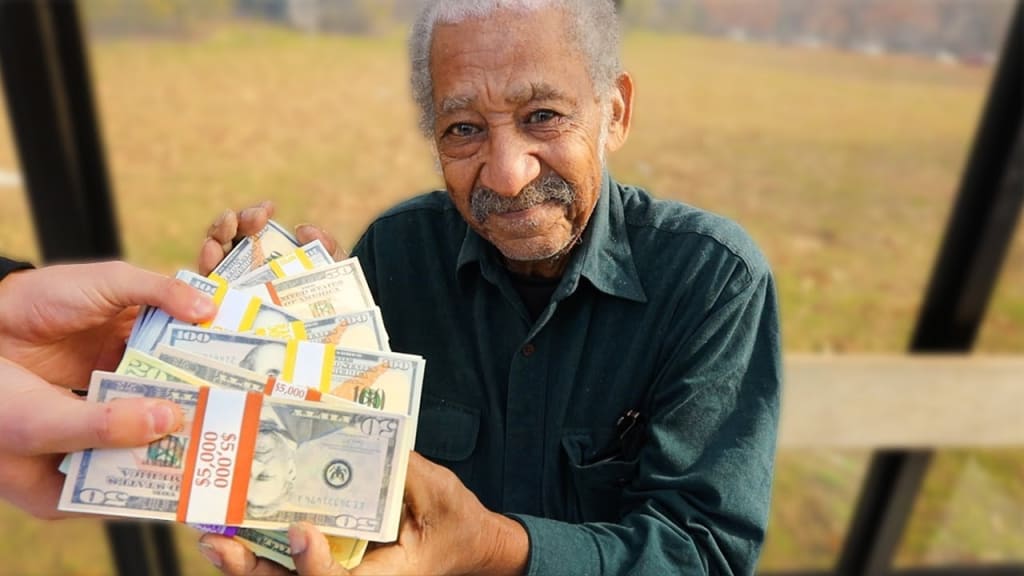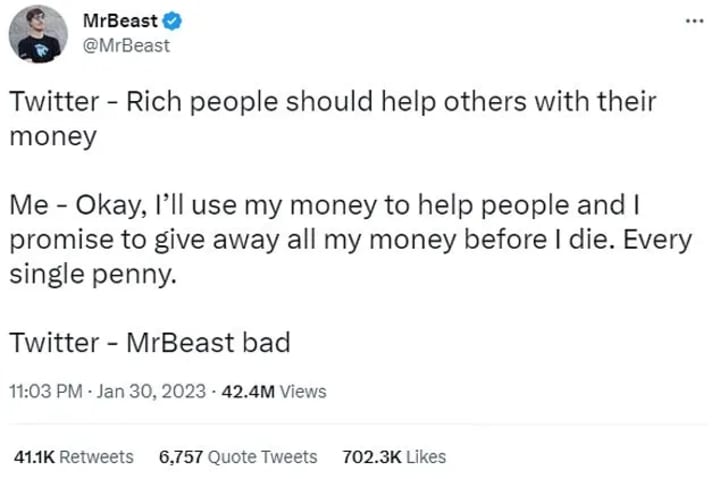Why Kindness Influencers Aren’t Kind At All
Altruistic or subtly selfish?

Social media platforms have become powerful tools for spreading messages, ideologies, and influencing behaviors. Among the millions of influencers populating these platforms, are a unique brand of influencers known as “kindness influencers.” These people leverage their online presence to promote acts of kindness, compassion, and positivity.
While their intentions may seem noble on paper, the rise of kindness influencers has sparked debates surrounding the ethics of their actions. So in this article, lets dive into the complexities of kindness influencers, and explore the ethical implications of their influence on society.
Defining Kindness Influencers
Kindness influencers are people who use social media platforms to advocate for and inspire acts of kindness, altruism, and empathy. They often share heartwarming stories, motivational quotes, and practical tips for spreading positivity. These influencers aim to create a ripple effect of positivity, encouraging their followers to prioritize compassion in their daily lives.
Popularized by the Youtuber Mr. Beast, he went viral for giving away large sums of money to random people in need. His actions led to the rise of kindness content where many people follow in his footsteps to perform random acts of kindness to those in need. The range of content from these influencers may include acts of charity to the homeless, comforting those who seem to be depressed, and promoting messages of self-care and mental well-being.
The Appeal Of Kindness Influencers
With so much negativity and divisiveness occurring around the world, kindness content is a means to help alleviate any feelings of pessimism and despair and almost serves as a beacon of hope and optimism. As a result, there are many aspiring content creators who are aiming to bring some good to their respective communities and provide some hope to a hard world.
Their content provides a welcome respite from the constant barrage of bad news and serves as a reminder of the inherent goodness in humanity. Moreover, their relatable personas and engaging short form content make it easy for audiences to connect with and emulate their behavior.
Is Kindness Content Ethical?
While the intentions of kindness influencers may be commendable, their actions raise important ethical questions. One of the biggest concern is the commodification of kindness. Critics argue that by monetizing acts of compassion, kindness influencers are diluting the authenticity of the act of charity and their overall message.
With so many different types of kindness content displayed on social media, the question has to be asked how much of these kinds of videos are performative for the sake of views. As there is a fine line between genuine altruism and performative kindness, the formulaic nature of kindness content makes it susceptible to those who primarily publish kindness content for likes, shares, and brand partnerships.
Jubilee Media documented a very interesting take on the process of trying to film and produce a kindness content video. Throughout their attempt, they struggled to find someone to charitably give money to, and they also ran in the ethical implications of primarily giving money away to make more money. As a result, the monetization aspect of kindness content raises a number of concerns regarding intention and character.
This creates a chicken and egg scenario because it questions how much of the content kindness influencers film are performative and manufactured. If we reference popular ethical theories such as Utilitarianism then we can justify their performative actions because the ends justify the means.
However, Scumbag Dad, a satirical content creator goes in-depth about the ethical implications of the matter, and asks how exploitative would these kindness influencers need to be in order for the audience to say no more. As he points out, a significant chunk of kindness content can be easily recreated and often times these content creators will spend hours in order to find the correct sob story to use for their narrative means.
If we refer to Deontological ethics and Virtue ethics which emphasize the importance of moral duty and principles, then philosophers like Immanuel Kant would argue that kindness influencers are inherently immoral and unempathetic because they are using unsuspecting people for their own personal gain. With that in mind, genuine kindness influencers have a responsibility to ensure that their content remains authentic and socially responsible while trying to avoid the pitfalls of performative activism and virtue signaling.
Is Kindness Content Good For Society?
Despite these ethical challenges, kindness influencers still have the potential to catalyze positive change when approached thoughtfully and authentically. To mitigate any concerns about commodification, these influencers have to prioritize transparency and sincerity in their interactions with their audience and their content.
However, another dilemma that arises is often caused by oversimplification of complex social issues. When Mr. Beast paid to have a thousand people undergo surgery to cure their blindness, he ran into a midst of controversy that questioned his character and the authenticity of his business model.
When kindness influencers offer a simple solution to systemic social problems such as poverty, healthcare, and class based inequality, it points out the dystopian nature where society is dependent on the kindness of the ultra rich instead of their government. Furthermore, this notion almost villainizes kindness influencers for promoting the message that systemic issues can be solved through by monetizing the suffering of others.
While these gestures can certainly make a difference on an individual level, kindness influencers have to be transparent to ensure their audience that they are creating this kind of content genuinely. As content creators such as Mr. Beast has made his career based on these kinds of videos, other kindness influencers need to be honest about their motivations, and actively engage in meaningful dialogue about the complexities of social issues.

By taking an extra step to leverage their platforms to amplify marginalized voices and support grassroots movements working towards systemic change, kindness influencers can use their influence to raise awareness about structural inequities and advocate for policy reforms. They can also move beyond individual acts of kindness to address root causes of injustice.
How Kind Are Kindness Influencers?
While kindness influencers may adopt noble ideals, their actions often betray a deeper truth and make us question whether if they are genuinely performing a random act of kindness or simply acting performance charity. As we navigate the complexities of social media, it is essential to scrutinize the intentions behind the content we consume and challenge the notion that popularity and profitability equate to genuine compassion.
If you end up questioning the logistics of a piece of content, it is important to critically examine the content itself and do some research to ensure that you are watching a genuine piece of altruistic media. At the end of the day, true kindness transcends likes, shares, and followers, because it is rooted in empathy, authenticity, and a sincere desire to make the world a better place for all.
If you liked what you read, be sure to like the heck out of it and follow for more related content!
About the Creator
Jay Kobayashi
A starving writer from LA who aspires to be plagiarized one day. I like to write about academic pieces that identifies philosophy and psychology in pop culture, and sometimes random fun pieces that interests me or the algorithm!






Comments
There are no comments for this story
Be the first to respond and start the conversation.